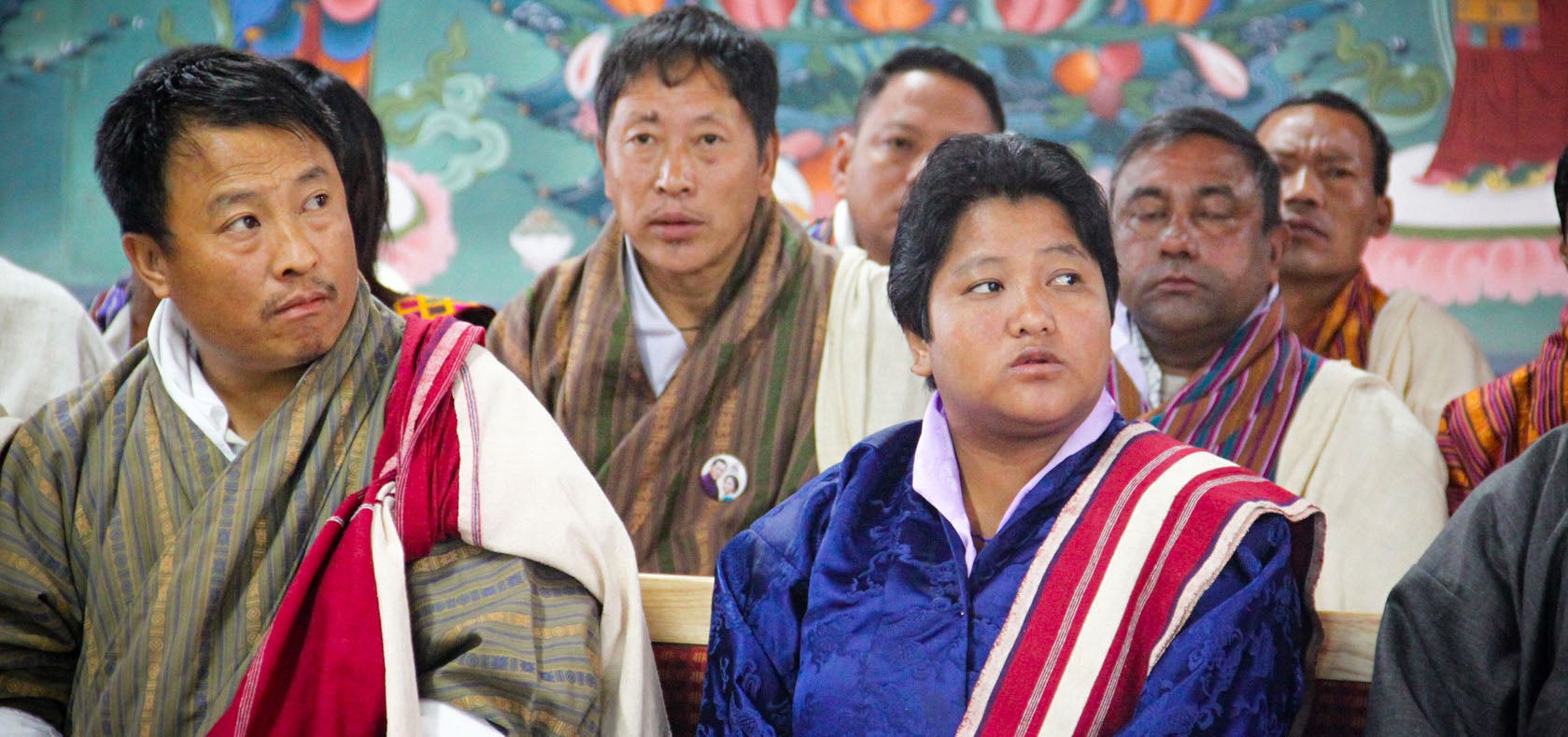Programmes

Promoting Women’s Political leadership and Gender Responsive Governance in the UNDAF
The regional programme on “Promoting Women’s Political leadership and Gender Responsive Governance” feeds directly into the Bhutan UNDAF, under an agreement signed with the UNRC/ UNDP.
It provides technical advice and assistance to the National Commission for Women and Children (NCWC), GNHC, Department of Budget and Department of Local Governance. The areas covered include research and capacity development for women’s effective role in local governance, Gender Responsive Budgeting, reporting on CEDAW (Convention on Elimination of All Forms of Discrimination Against Women), BPfA (Beijing Platform for Action) and the Dhaka Resolution.
A documentary film was produced and broadcast on national television to inspire a new generation of women leaders in Bhutan. The film explores factors that have constrained women’s participation in governance and provides valuable insights to policy-makers and the general public. It looks at the realities of the constraints faced by Bhutanese women from participating in their careers in government. A series of Regional Workshops have been organized to inspire a new generation of girls to aspire to become leaders. The film has also been distributed to schools and institutes and a website had been created to exchange views.
Policy learning on indigenous women’s knowledge of land use in swidden cultivation systems
UN Women, in collaboration with the Christensen Fund, National Commission for Women and Children (NCWC), Royal Government of Bhutan, assists policy learning on indigenous women’s knowledge of land use in swidden cultivation systems.
It included a research study based on the practice and role of women in swidden cultivation, also known as tsheri in Bhutan. The research has shown that swidden agriculture plays an important and multi-functional role in the livelihood of rural households and contributes to the sustainability of natural resources. Most of the women who are dependent on swidden cultivation are often the most vulnerable as their knowledge of natural resource management and livelihood through swidden agriculture, are closely linked, and should not be disturbed without prior consent of the farmers.
Enforcement of policies and the systematic discouragement of swidden cultivation has impacted land use practices over the last 17 years. Alternatives promoted by the Government have not effectively addressed the issue, but rather led to new challenges for the farmers. Most importantly, knowledge of the farmers, (a significant majority of whom are women) on traditional agricultural practices has been eroded and have not been taken into consideration when new technologies were introduced.
It has been suggested that the regulation on use of fire could be reconsidered and farmers and forest officials could learn from traditional practices of burning plants in preparation of swidden fields. The positive effect of controlled burning (followed under swidden farming) on the agricultural fields needs to be more widely understood so that swidden cultivation products could be certified as organic.
The study findings were shared in a policy consultation with concerned Ministries (Ministry of Agriculture and Forests, Ministry of Home Affairs, Ministry of Tourism and National Commission for Women and Children) and civil society organizations (Tarayana, Bhutan Association for Women Entrepreneurs) in Thimpu, Bhutan on 29 December 2010. The interest shown by concerned Ministries implicitly suggested a serious reconsideration on the part of the Government on the ban of swidden cultivation. The meeting suggested that swidden cultivation maybe allowed for those farmers who wish to practice it. At the same time, swidden cultivators need research and development support, as well as a more enabling policy environment, to help them improve and adapt their swidden cultivation practices to the current day situation of food insecurity and the need for increase in agricultural productivity, both contributing to Outcome 2 of the Bhutan UNDAF.
Supporting reporting and implementation of the Convention on Elimination of All Forms of Discrimination against Women (CEDAW)
UN Women South Asia Regional Office has been supporting the Royal Government of Bhutan with regard to CEDAW reporting and implementation. This includes preparation of the National Report, support to attending the reporting and translation of CEDAW Concluding Comments into two languages to make it more accessible. Support is being extended to the National Commission for Women and Children (NCWC) to follow up on the CEDAW Concluding Comments with regard to violence against women, specifically, domestic violence and trafficking.
A core group meeting was organized to discuss and finalize the cross border standard operating procedures (SOP). A study visit for the legal adviser was enabled. As result of this exposure, the draft bill on domestic violence was reviewed and revised. The draft bill has been submitted to the Cabinet and is expected to be tabled in Parliament in the summer of 2011.
A national peer learning workshop on CEDAW led to key recommendations with regard to the following:
- Violence against women
- Women’s role in decision making and political participation; and
- Universal birth registration and single parenting.
The Concluding Observations of Bhutan’s Seventh CEDAW Report were shared as well as views on how Bhutan could strategically address the issues were raised. Participants included Parliamentarians, Gender Focal Points, NCWC Commissioners, representatives of NGOs, Media, Royal Bhutan Police, representatives from the judicial and legal services and contestants to the 2010 Miss Bhutan contest.
The workshop also made an effort to reinforce understanding pertaining to different aspects of the CEDAW and other aspects of gender and human rights.
Anti-trafficking and Cross Border Standard Operating Procedure (SOP)
A Core Committee Group Meeting was held to finalize the CProcedure. It included various stakeholders, such as senior representatives from Immigration, Bureau of Law and Order of the Ministry of Home Affairs, Royal Bhutan Police, including the Superintendent of Crime.
Recommendations were made to align some aspects of the procedures with existing laws, policies and systems in Bhutan. The final draft will be tabled at the upcoming Consultation on Human Trafficking in December 2011.
Ending Violence Against Women
A documentary film on domestic violence was screened before a large forum to elicit feedback. The launch has been planned for International Women’s Day 2012.